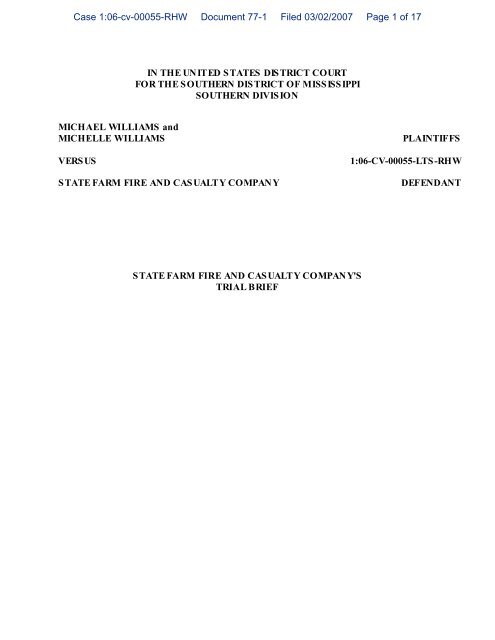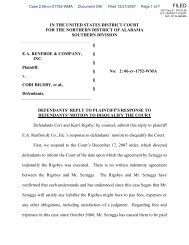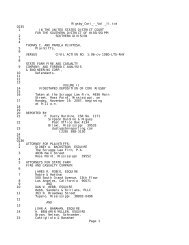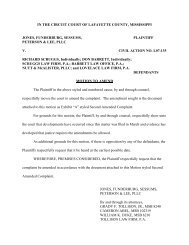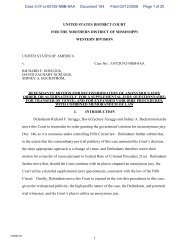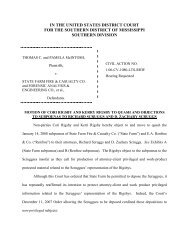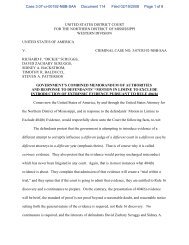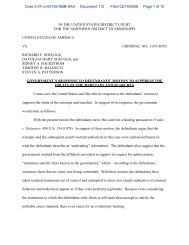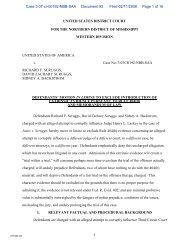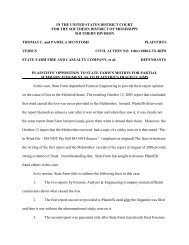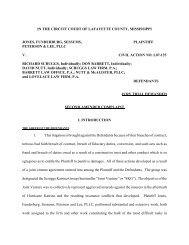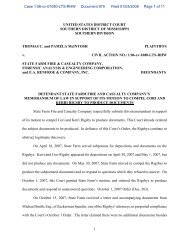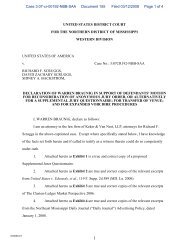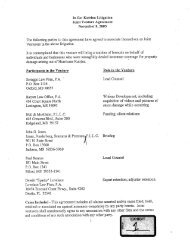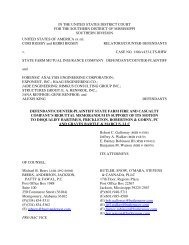this pdf of the State Farm trial brief - Insurance Coverage Blog
this pdf of the State Farm trial brief - Insurance Coverage Blog
this pdf of the State Farm trial brief - Insurance Coverage Blog
You also want an ePaper? Increase the reach of your titles
YUMPU automatically turns print PDFs into web optimized ePapers that Google loves.
Case 1:06-cv-00055-RHW Document 77-1 Filed 03/02/2007 Page 1 <strong>of</strong> 17<br />
IN THE UNITED STATES DISTRICT COURT<br />
FOR THE SOUTHERN DISTRICT OF MISSISSIPPI<br />
SOUTHERN DIVISION<br />
MICHAEL WILLIAMS and<br />
MICHELLE WILLIAMS<br />
VERSUS<br />
STATE FARM FIRE AND CASUALTY COMPANY<br />
PLAINTIFFS<br />
1:06-CV-00055-LTS-RHW<br />
DEFENDANT<br />
STATE FARM FIRE AND CASUALTY COMPANY'S<br />
TRIAL BRIEF
Case 1:06-cv-00055-RHW Document 77-1 Filed 03/02/2007 Page 2 <strong>of</strong> 17<br />
TABLE OF CONTENTS<br />
I. <strong>State</strong> <strong>Farm</strong>'s "Wind/Water Claim Handling Protocol" Is Relevant and Admissible<br />
(If at All) Only in <strong>the</strong> Second Phase <strong>of</strong> <strong>the</strong> Trial .................................................................1<br />
A. The Wind/Water Claim Handling Protocol Is Not Admissible in Phase I <strong>of</strong><br />
<strong>the</strong> Trial....................................................................................................................1<br />
B. The Wind/Water Claim Handling Protocol Should Be Admitted in Phase<br />
II Only If It Has Some Demonstrable Connection to <strong>the</strong> Handling <strong>of</strong><br />
Plaintiffs' Claims......................................................................................................3<br />
C. The Wind/Water Claims Handling Protocol Is Not Evidence <strong>of</strong> Bad Faith<br />
or O<strong>the</strong>r Culpable Conduct Meriting Punitive Damages .........................................4<br />
II.<br />
To Recover for Wind Damage, Plaintiffs Have <strong>the</strong> Burden <strong>of</strong> Proving <strong>the</strong> Amount<br />
<strong>of</strong> Independent Damage Attributable to Wind.....................................................................6<br />
III. Plaintiffs Are Not Entitled to Punitive Damages .................................................................9<br />
A. Plaintiffs Cannot Show that <strong>State</strong> <strong>Farm</strong> Did Not Have an Arguable Basis<br />
for Denying Their Claim........................................................................................10<br />
B. Plaintiffs Cannot Make <strong>the</strong> Additional Required Showing By Clear and<br />
Convincing Evidence that <strong>State</strong> <strong>Farm</strong> Acted with Actual Malice or Gross<br />
Negligence or Committed Actual Fraud in Denying Plaintiffs' Claim ..................13
Case 1:06-cv-00055-RHW Document 77-1 Filed 03/02/2007 Page 3 <strong>of</strong> 17<br />
STATE FARM FIRE AND CASUALTY COMPANY'S TRIAL BRIEF<br />
<strong>State</strong> <strong>Farm</strong> Fire and Casualty Company ("<strong>State</strong> <strong>Farm</strong>") respectfully submits <strong>this</strong> <strong>trial</strong> <strong>brief</strong><br />
in order to address certain issues raised at <strong>the</strong> pre-<strong>trial</strong> conference and o<strong>the</strong>r important issues that<br />
may arise during <strong>the</strong> <strong>trial</strong> <strong>of</strong> <strong>this</strong> case.<br />
I. <strong>State</strong> <strong>Farm</strong>'s "Wind/Water Claim Handling Protocol" Is Relevant and Admissible<br />
(If at All) Only in <strong>the</strong> Second Phase <strong>of</strong> <strong>the</strong> Trial<br />
A. The Wind/Water Claim Handling Protocol Is Not Admissible in Phase I <strong>of</strong><br />
<strong>the</strong> Trial<br />
<strong>State</strong> <strong>Farm</strong>'s wind/water claim handling protocol ("<strong>the</strong> protocol") should not be admitted<br />
in <strong>the</strong> first phase <strong>of</strong> <strong>the</strong> <strong>trial</strong>, which will determine whe<strong>the</strong>r Plaintiffs are entitled to payment <strong>of</strong><br />
<strong>the</strong>ir insurance claim under <strong>the</strong>ir <strong>State</strong> <strong>Farm</strong> homeowners policy. The protocol has no relevance<br />
to <strong>the</strong> question whe<strong>the</strong>r Plaintiffs' loss is covered and if so, <strong>the</strong> extent <strong>of</strong> covered damages.<br />
Ra<strong>the</strong>r, as a claim handling guideline, <strong>the</strong> protocol is relevant, if at all, only to <strong>the</strong> manner in<br />
which <strong>State</strong> <strong>Farm</strong> made its decision to deny Plaintiffs' insurance claim. Accordingly, it may be<br />
admitted (if at all) only if <strong>the</strong> <strong>trial</strong> proceeds to Phase II. See Bridges v. Enter. Prods. Co., No.<br />
3:05cv786-WHB-LRA, 2007 WL 571074, at *3 (S.D. Miss. Feb. 20, 2007) (excluding evidence<br />
relevant only to punitive damages from liability and compensatory damages portion <strong>of</strong> <strong>trial</strong>);<br />
Beck v. Koppers, Inc., Nos. 3:03CV60-P-D, 3:04CV160-P-D, 2006 WL 2228876, at *1 (N.D.<br />
Miss. Apr. 3, 2006) (noting that "<strong>the</strong> court will not admit evidence during <strong>the</strong> first stage <strong>of</strong> <strong>the</strong><br />
<strong>trial</strong> that is only relevant to punitive damages"); Bradfield v. Schwartz, 936 So. 2d 931, 938<br />
(Miss. 2006) ("If punitive damages are indeed to be awarded within <strong>the</strong> limitations prescribed by<br />
[<strong>the</strong> punitive damages] statute, <strong>the</strong>n evidence which does not pertain to compensating <strong>the</strong><br />
plaintiff but only pertains to pro<strong>of</strong> that a punitive damage award is appropriate, should not be<br />
heard until liability has been determined.").
Case 1:06-cv-00055-RHW Document 77-1 Filed 03/02/2007 Page 4 <strong>of</strong> 17<br />
The protocol was provided to some <strong>State</strong> <strong>Farm</strong> claims adjusters in Mississippi and o<strong>the</strong>r<br />
areas affected by Hurricane Katrina "as a guide for handling various wind and/or water claims."<br />
Ex. A at 1. The purpose <strong>of</strong> <strong>the</strong> document was to describe <strong>the</strong> process to be used in determining<br />
whe<strong>the</strong>r certain claims were or were not payable. Among o<strong>the</strong>r directives, <strong>the</strong> protocol instructs<br />
adjusters that "[e]ach claim should be handled on its merits," that a "causation investigation<br />
should be conducted" in each case and that <strong>the</strong> adjuster should document evidence <strong>of</strong> wind<br />
and/or water damage. Id. It states that adjusters are to consider "any available information" in<br />
making a coverage determination, including evidence ga<strong>the</strong>red at <strong>the</strong>-on site inspection;<br />
documentation <strong>of</strong> physical evidence such as water lines, an examination <strong>of</strong> <strong>the</strong> debris, and an<br />
analysis <strong>of</strong> <strong>the</strong> physical damage to <strong>the</strong> structure; evidence ga<strong>the</strong>red at neighboring locations; data<br />
obtained from reports describing damage to <strong>the</strong> area; information from witnesses and<br />
policyholders; and input from experts that may be retained to provide guidance. Id.<br />
The protocol sets forth <strong>the</strong> following categories <strong>of</strong> damage and gives instructions for each:<br />
(i) damage to <strong>the</strong> property caused by wind (covered); (ii) damage to separate portions <strong>of</strong> <strong>the</strong><br />
property that can be attributed to ei<strong>the</strong>r wind or excluded water; (iii) damage to <strong>the</strong> property<br />
caused by excluded water, with no available coverage; and (iv) damage to <strong>the</strong> property caused by<br />
floodwaters and covered by an available flood policy. Id.<br />
With respect to damage to separate portions <strong>of</strong> <strong>the</strong> property that could be attributed to<br />
wind or water, <strong>the</strong> protocol indicates that "[e]ach type <strong>of</strong> damage should be documented in <strong>the</strong><br />
claim file" and that <strong>the</strong> "claim representative should calculate <strong>the</strong> separate damage attributable to<br />
each peril and handle <strong>the</strong> adjustment accordingly." Id. at 2. However, "[w]hen <strong>the</strong> investigation<br />
indicates that <strong>the</strong> damage was caused by excluded water and <strong>the</strong> claim investigation does not<br />
reveal independent windstorm damage to separate portions <strong>of</strong> <strong>the</strong> property, <strong>the</strong>re is no coverage<br />
2
Case 1:06-cv-00055-RHW Document 77-1 Filed 03/02/2007 Page 5 <strong>of</strong> 17<br />
available under <strong>the</strong> homeowners policy." Id. The protocol indicates that <strong>the</strong> relevant policy<br />
language supporting <strong>this</strong> instruction is <strong>the</strong> water damage exclusion and <strong>the</strong> anti-concurrent cause<br />
lead-in language and quotes that language. Id.<br />
As <strong>this</strong> description makes clear, <strong>the</strong> protocol has no relevance to establishing <strong>the</strong> actual<br />
facts and circumstances <strong>of</strong> <strong>the</strong> damage to Plaintiffs' home or to determining whe<strong>the</strong>r and to what<br />
extent that damage falls within <strong>the</strong> terms <strong>of</strong> Plaintiffs' insurance contract. Accordingly, it should<br />
be excluded from Phase I <strong>of</strong> <strong>the</strong> <strong>trial</strong> in <strong>this</strong> case.<br />
B. The Wind/Water Claim Handling Protocol Should Be Admitted in Phase II<br />
Only If It Has Some Demonstrable Connection to <strong>the</strong> Handling <strong>of</strong> Plaintiffs'<br />
Claims<br />
<strong>State</strong> <strong>Farm</strong> respectfully submits that <strong>the</strong> wind/water<br />
claim handling protocol is<br />
inadmissible in Phase II <strong>of</strong> <strong>the</strong> <strong>trial</strong> unless it was used by or guided <strong>the</strong> particular claims adjuster<br />
who handled Plaintiffs' claim.<br />
Plaintiffs contend that <strong>the</strong> protocol evidences bad faith on <strong>the</strong> part <strong>of</strong> <strong>State</strong> <strong>Farm</strong> in its<br />
handling <strong>of</strong> Katrina claims. As shown below, that contention is incorrect. See Point I.C infra.<br />
In any case, <strong>the</strong> protocol is not relevant to Plaintiffs' claim for extracontractual damages unless it<br />
can be shown to have been used in or affected <strong>the</strong> handling <strong>of</strong> Plaintiffs' insurance claims. In <strong>the</strong><br />
present case, <strong>the</strong> <strong>State</strong> <strong>Farm</strong> team manager who handled Plaintiffs' claim testified at her<br />
deposition that she did not recall seeing a copy <strong>of</strong> <strong>the</strong> protocol and that it did not influence her<br />
handling <strong>of</strong> Plaintiffs' insurance claim.<br />
Accordingly, <strong>the</strong> protocol is irrelevant and <strong>the</strong>refore<br />
inadmissible. See Fed. R. Evid. 402 ("[e]vidence which is not relevant is not admissible").<br />
For <strong>the</strong> same reason, <strong>the</strong> protocol cannot furnish a basis for punitive damages in <strong>this</strong> case<br />
because it does not constitute evidence <strong>of</strong> <strong>State</strong> <strong>Farm</strong>'s purported misconduct towards Plaintiffs,<br />
but only <strong>of</strong> alleged misconduct toward o<strong>the</strong>r insureds whose claims are not now before <strong>the</strong> Court.<br />
Such conduct towards o<strong>the</strong>rs is not punishable in <strong>this</strong> case. See Philip Morris USA v. Williams,<br />
3
Case 1:06-cv-00055-RHW Document 77-1 Filed 03/02/2007 Page 6 <strong>of</strong> 17<br />
127 S. Ct. 1057, 1063 (2007) (due process "forbids a <strong>State</strong> to use a punitive damages award to<br />
punish a defendant for injury that it inflicts upon nonparties"). Moreover, claims handling based<br />
upon use <strong>of</strong> <strong>the</strong> protocol is not similar conduct to claims handling without <strong>the</strong> protocol. Thus,<br />
<strong>the</strong> protocol is not relevant to showing <strong>the</strong> degree <strong>of</strong> reprehensibility in <strong>the</strong> conduct alleged in<br />
<strong>this</strong> case.<br />
See <strong>State</strong> <strong>Farm</strong> Mut. Auto. Ins. Co. v. Campbell, 538 U.S. 408, 422 (2003) ("A<br />
defendant's dissimilar acts, independent from <strong>the</strong> acts upon which liability was premised, may<br />
not serve as <strong>the</strong> basis for punitive damages.").<br />
C. The Wind/Water Claims Handling Protocol Is Not Evidence <strong>of</strong> Bad Faith or<br />
O<strong>the</strong>r Culpable Conduct Meriting Punitive Damages<br />
In Broussard v. <strong>State</strong> <strong>Farm</strong> Fire and Casualty Co., No. 1:06cv6-LTS-RHW, <strong>the</strong> Court<br />
erroneously found a basis for punitive damages in <strong>the</strong> protocol, which, in <strong>the</strong> Court's view,<br />
"emphasized <strong>the</strong> exclusion but is at odds with o<strong>the</strong>r express terms <strong>of</strong> <strong>the</strong> insurance contract";<br />
"attempted impermissibly to place <strong>the</strong> burden <strong>of</strong> pro<strong>of</strong> on <strong>the</strong> Plaintiffs to establish that <strong>the</strong>ir<br />
losses were caused by wind" and "in slab cases, . . . assigned 100% <strong>of</strong> <strong>the</strong> loss to flooding unless<br />
<strong>the</strong> policyholder could show 'independent windstorm damage' or produce an eyewitness to <strong>the</strong><br />
destruction." See Broussard, Order [Broussard 108], p. 2. In fact, <strong>the</strong> protocol reasonably<br />
interpreted <strong>the</strong> anti-concurrent cause language <strong>of</strong> <strong>the</strong> policy, which excludes damage that "would<br />
not have occurred in <strong>the</strong> absence <strong>of</strong>" excluded water damage, as limiting coverage in storm surge<br />
cases to "independent windstorm damage." Ex. A at 2. The fact that <strong>the</strong> Court later invalidated<br />
<strong>State</strong> <strong>Farm</strong>'s anti-concurrent cause language (which had been upheld and applied by Mississippi<br />
state and federal courts 1 ) does not transform <strong>State</strong> <strong>Farm</strong>'s attempt to implement that contractual<br />
1<br />
See Boteler v. <strong>State</strong> <strong>Farm</strong> Cas. Ins. Co., 876 So. 2d 1067, 1069-70 (Miss. Ct. App. 2004) (<strong>State</strong> <strong>Farm</strong>'s anticoncurrent<br />
cause lead-in language is "clear" and "[u]nambiguous language <strong>of</strong> exclusion"); Rhoden v. <strong>State</strong> <strong>Farm</strong><br />
Fire & Cas. Co., 32 F. Supp. 2d 907, 911-13 (S.D. Miss. 1998) (Mississippi law), aff'd, 200 F.3d 815 (5th Cir.<br />
1999); Wallace v. City <strong>of</strong> Jackson, No. 251-05-941 CIV, slip op. at 3 (Hinds County Cir. Ct. Miss. Sept. 15,<br />
2006) (<strong>State</strong> <strong>Farm</strong>'s lead-in language has been "judicially determined to be clear and unambiguous").<br />
4
Case 1:06-cv-00055-RHW Document 77-1 Filed 03/02/2007 Page 7 <strong>of</strong> 17<br />
language along with <strong>the</strong> water damage exclusion itself into a basis for punitive damages.<br />
Moreover, contrary to <strong>the</strong> Court's analysis in Broussard, <strong>the</strong> protocol nowhere instructs adjusters<br />
to "assign 100% <strong>of</strong> <strong>the</strong> loss to flooding unless <strong>the</strong> policyholder could show 'independent<br />
windstorm damage' or produce an eyewitness to <strong>the</strong> destruction." Order at 2. Ra<strong>the</strong>r, as shown<br />
above, it instructs adjusters to handle each claim "on its merits"; to conduct a "causation<br />
investigation" documenting and considering "[e]vidence ga<strong>the</strong>red at <strong>the</strong> on site inspection,"<br />
including "physical evidence such as water lines, an examination <strong>of</strong> <strong>the</strong> debris, and an analysis <strong>of</strong><br />
physical damage to <strong>the</strong> structure," as well as "evidence ga<strong>the</strong>red at neighboring locations,"<br />
"[d]ata obtained from reports describing damage to <strong>the</strong> area," and "information from witnesses<br />
and policyholders"; and to "calculate separate damage attributable to wind and water and handle<br />
<strong>the</strong> adjustment accordingly." Ex. A at 1-2.<br />
Moreover, to <strong>the</strong> extent <strong>the</strong> protocol can be read as speaking to burdens <strong>of</strong> pro<strong>of</strong>, <strong>the</strong><br />
burdens <strong>of</strong> pro<strong>of</strong> that were criticized by <strong>the</strong> Court in Broussard -- namely, requiring<br />
policyholders to provide evidence that separate and independent wind damage occurred before<br />
<strong>the</strong> storm surge completely destroyed <strong>the</strong> residence -- are in accordance with <strong>the</strong> burdens <strong>of</strong><br />
pro<strong>of</strong> adopted by numerous courts, including <strong>the</strong> Fifth Circuit.<br />
See Point II infra. Given <strong>the</strong><br />
substantial authority placing <strong>the</strong> burden on policyholders to establish <strong>the</strong> existence and amount<br />
<strong>of</strong> separate wind damage in circumstances such as <strong>the</strong>se, <strong>State</strong> <strong>Farm</strong> certainly acted in good faith<br />
in adopting its wind/water claim handling protocol, which it believed to reflect accurately <strong>the</strong><br />
terms <strong>of</strong> its insurance contracts as well as <strong>the</strong> applicable laws governing those contracts.<br />
5
Case 1:06-cv-00055-RHW Document 77-1 Filed 03/02/2007 Page 8 <strong>of</strong> 17<br />
II.<br />
To Recover for Wind Damage, Plaintiffs Have <strong>the</strong> Burden <strong>of</strong> Proving <strong>the</strong> Amount <strong>of</strong><br />
Independent Damage Attributable to Wind<br />
As <strong>the</strong> Court recognized in Broussard, in cases involving <strong>the</strong> total destruction <strong>of</strong> a<br />
dwelling, "it is <strong>the</strong> allocation <strong>of</strong> burden <strong>of</strong> pro<strong>of</strong> that is critical . . . ." Broussard, Opinion on<br />
Rule 50 Motions for Judgment as a Matter <strong>of</strong> Law [Broussard 106], p. 3, 6.<br />
As will be demonstrated below, it is Plaintiffs, not <strong>State</strong> <strong>Farm</strong>, who bear <strong>the</strong> burden <strong>of</strong><br />
segregating covered from noncovered damage. That is because Plaintiffs must prove <strong>the</strong> extent<br />
<strong>of</strong> <strong>the</strong>ir claimed loss as part <strong>of</strong> <strong>the</strong>ir burden <strong>of</strong> proving <strong>the</strong>ir entitlement to contract damages.<br />
Under an "open peril" policy such as that at issue in <strong>this</strong> case, if <strong>the</strong> insureds meet <strong>the</strong>ir<br />
threshold burden <strong>of</strong> proving an accidental direct physical loss to <strong>the</strong> insured property, <strong>the</strong> burden<br />
shifts to <strong>the</strong> insurer to prove <strong>the</strong> applicability <strong>of</strong> any exclusion asserted as an affirmative defense.<br />
See Commercial Union Ins. Co. v. Byrne, 248 So. 2d 777, 782 (Miss. 1971). However, as many<br />
courts have held, once <strong>the</strong> insurer adduces evidence that <strong>the</strong> insured's loss was caused by an<br />
excluded peril, <strong>the</strong> burden shifts back to <strong>the</strong> insured to show that <strong>the</strong> claim does not fall within<br />
<strong>the</strong> exclusion or to segregate covered losses from noncovered losses. See, e.g., Royal Surplus<br />
Lines Ins. Co. v. Brownsville Indep. Sch. Dist., 404 F. Supp. 2d 942, 949 n.7 (S.D. Tex. 2005)<br />
("Once <strong>the</strong> insurer demonstrates that an exclusion arguably applies, <strong>the</strong> burden <strong>the</strong>n shifts back<br />
to <strong>the</strong> insured to show that <strong>the</strong> claim does not fall within <strong>the</strong> exclusion or that it comes within an<br />
exception to <strong>the</strong> exclusion.") (citing Britt v. Cambridge Mut. Fire Ins. Co., 717 S.W.2d 476, 482<br />
(Tex. App. 1986)). 2<br />
This "shifting back" <strong>of</strong> <strong>the</strong> burden <strong>of</strong> pro<strong>of</strong> is in accord with controlling<br />
2<br />
The burden shifting rule applied in Royal Surplus, supra, is routinely applied in cases dealing with exceptions to<br />
exclusions. See, e.g., U.S. Fid. & Guar. Co. v. B&B Oil Well Serv., Inc., 910 F. Supp. 1172, 1181 (S.D. Miss.<br />
1995) (recognizing that "most courts have held that <strong>the</strong> burden is on <strong>the</strong> insured to prove" <strong>the</strong> applicability <strong>of</strong> an<br />
exception to an exclusion); Harrow Prods., Inc. v. Liberty Mut. Ins. Co., 64 F.3d 1015, 1020 (6th Cir. 1995)<br />
(similar). Among <strong>the</strong> rationales <strong>of</strong>fered for <strong>the</strong> rule are that <strong>the</strong> insured has <strong>the</strong> burden <strong>of</strong> proving its entitlement<br />
to coverage and that placing <strong>the</strong> burden on <strong>the</strong> insured "absolves <strong>the</strong> insurer from bearing <strong>the</strong> difficult burden <strong>of</strong><br />
6
Case 1:06-cv-00055-RHW Document 77-1 Filed 03/02/2007 Page 9 <strong>of</strong> 17<br />
Mississippi jurisprudence that "a plaintiff has <strong>the</strong> burden <strong>of</strong> proving a right to recover under <strong>the</strong><br />
insurance policy sued on" and that "[t]hat basic burden never shifts from <strong>the</strong> plaintiff." 3 Britt v.<br />
Travelers Ins. Co., 566 F.2d 1020, 1022 (5th Cir. 1978) (Mississippi law); see also Coahoma<br />
County Bank & Trust Co. v. Feinberg, 128 So. 2d 562, 565 (Miss. 1961) (reiterating rule that<br />
burden <strong>of</strong> proving entitlement to insurance policy proceeds rests on person seeking proceeds).<br />
The rule imposing on <strong>the</strong> insured <strong>the</strong> burden <strong>of</strong> proving <strong>the</strong> amount <strong>of</strong> loss attributable to<br />
a covered peril, or <strong>of</strong> segregating <strong>the</strong> covered damage from <strong>the</strong> excluded damage, flows from<br />
"<strong>the</strong> basic principle that insureds are entitled to recover only that which is covered under <strong>the</strong>ir<br />
policy; that for which <strong>the</strong>y paid premiums." Wallis v. United Servs. Auto. Ass'n, 2 S.W.3d 300,<br />
303 (Tex. App. 1999). See also Paulson v. Fire Ins. Exch., 393 S.W.2d 316, 319 (Tex. 1965)<br />
(property policy covering hurricane but excluding water damage) ("It is essential that <strong>the</strong> insured<br />
produce evidence which will afford a reasonable basis for estimating <strong>the</strong> amount <strong>of</strong> damage or<br />
<strong>the</strong> proportionate part <strong>of</strong> damage caused by a risk covered by <strong>the</strong> insurance policy"); Harbor<br />
House Condo. Ass'n v. Massachusetts Bay Ins. Co., 915 F.2d 316, 318 (7th Cir. 1990) (all risk<br />
policy) ("It is not enough to show that a loss may have occurred. Plaintiffs must prove <strong>the</strong> nature,<br />
extent or amount <strong>of</strong> <strong>the</strong>ir loss to a reasonable degree <strong>of</strong> certainty before any award <strong>of</strong> damages<br />
can be made under <strong>the</strong> policy." (second emphasis added)).<br />
As noted in one leading insurance<br />
treatise:<br />
Where <strong>the</strong> harm sustained by <strong>the</strong> insured is <strong>the</strong> result <strong>of</strong> two or<br />
more causes or risks, some <strong>of</strong> which are not covered, it is <strong>of</strong> course<br />
manifest that <strong>the</strong> insurer is only liable for so much <strong>of</strong> <strong>the</strong> total<br />
proving <strong>the</strong> negative." Highlands Ins. Co. v. Aerovox Inc., 676 N.E.2d 801, 805 (Mass. 1997). Both <strong>of</strong> <strong>the</strong>se<br />
rationales apply equally here.<br />
3<br />
Thus, for example, in Brown v. PFL Life <strong>Insurance</strong> Co., 312 F. Supp. 2d 863, 868 (N.D. Miss.), aff'd, 111 F.<br />
App'x 258 (5th Cir. 2004), after <strong>the</strong> insurer satisfied its burden <strong>of</strong> proving <strong>the</strong> applicability <strong>of</strong> <strong>the</strong> exclusion at<br />
issue, <strong>the</strong> court shifted <strong>the</strong> burden back to <strong>the</strong> plaintiff to rebut that showing; and because <strong>the</strong> plaintiff had<br />
"<strong>of</strong>fered no evidence, whatsoever, to contradict <strong>the</strong> [insurer's] findings," <strong>the</strong> court upheld <strong>the</strong> insurer's<br />
determination <strong>of</strong> noncoverage. Id. at 869.<br />
7
Case 1:06-cv-00055-RHW Document 77-1 Filed 03/02/2007 Page 10 <strong>of</strong> 17<br />
harm as was caused by <strong>the</strong> risk covered by <strong>the</strong> policy. . . . It is <strong>the</strong><br />
insured's burden to produce evidence that would afford a<br />
reasonable basis for estimating <strong>the</strong> amount <strong>of</strong> damage or <strong>the</strong><br />
proportionate part <strong>of</strong> damage caused by <strong>the</strong> covered peril and that<br />
by <strong>the</strong> excluded peril.<br />
12 Lee R. Russ & Thomas F. Segalla, Couch on <strong>Insurance</strong> § 175:9 (3d ed. 1997) (emphasis<br />
added); see 17A Couch on <strong>Insurance</strong> § 254:75 ("insureds whose losses are only partially<br />
reimbursable by <strong>the</strong> insurer" have been deemed to have <strong>the</strong> burden <strong>of</strong> "[s]egregating damages to<br />
<strong>the</strong> insured building from a covered peril from those caused by a noncovered peril"). See also<br />
Fiess v. <strong>State</strong> <strong>Farm</strong> Lloyds, 392 F.3d 802, 807 (5th Cir. 2004) ("Because <strong>the</strong> insured may only<br />
recover for damage caused by covered perils, <strong>the</strong> insured bears <strong>the</strong> burden <strong>of</strong> presenting<br />
evidence that will allow <strong>the</strong> trier <strong>of</strong> fact to segregate covered losses from non-covered losses<br />
(emphasis added)).<br />
The rule also accords with <strong>the</strong> basic tenet <strong>of</strong> Mississippi law that a plaintiff must prove<br />
"not only <strong>the</strong> fact <strong>of</strong> his injury, but <strong>the</strong> extent <strong>of</strong> <strong>the</strong> injury in order to support an award <strong>of</strong><br />
monetary damages," Savage v. LaGrange, 815 So. 2d 485, 491 (Miss. Ct. App. 2002) – a rule<br />
that applies equally in <strong>the</strong> insurance context. See Home Ins. Co. v. Greene, 229 So. 2d 576, 579<br />
(Miss. 1969) (noting that "[a]n insured seeking recovery on a policy insuring against fire has <strong>the</strong><br />
burden <strong>of</strong> proving <strong>the</strong> loss and its extent"); Coastal Plains Feeders, Inc. v. Hartford Fire Ins. Co.,<br />
545 F.2d 448, 453 (5th Cir. 1977) (Alabama law) (noting general rule that insured "<strong>of</strong> course,<br />
bore <strong>the</strong> burden <strong>of</strong> proving <strong>the</strong> amount <strong>of</strong> its damages; <strong>the</strong> jury could not be left free to speculate<br />
as to <strong>this</strong> amount"). Indeed, because allocation is central to <strong>the</strong> coverage claim, <strong>the</strong> insured's<br />
"failure to segregate covered and noncovered perils is fatal to recovery."<br />
Comsys Info. Tech.<br />
Servs., Inc. v. Twin City Fire Ins. Co., 130 S.W.3d 181, 198 (Tex. App. 2003) (liability policy);<br />
accord Patrick Schaumburg Autos., Inc. v. Hanover Ins. Co., 452 F. Supp. 2d 857, 863, 869,<br />
872-73 (N.D. Ill. 2006) (denying insured's motion for summary judgment even though it was<br />
8
Case 1:06-cv-00055-RHW Document 77-1 Filed 03/02/2007 Page 11 <strong>of</strong> 17<br />
"undisputed that [<strong>the</strong> insured] suffered some covered loss," because insured failed to satisfy its<br />
"burden <strong>of</strong> proving <strong>the</strong> amount <strong>of</strong> <strong>the</strong> covered loss").<br />
Accordingly, in order to prove <strong>the</strong>ir right to recover for alleged wind damage to <strong>the</strong>ir<br />
insured property, Plaintiffs must prove, in addition to <strong>the</strong> o<strong>the</strong>r issues on which <strong>the</strong>y bear <strong>the</strong><br />
burden <strong>of</strong> pro<strong>of</strong>, <strong>the</strong> extent <strong>of</strong> <strong>the</strong>ir covered loss – i.e., <strong>the</strong> amount <strong>of</strong> damage – that was caused<br />
by wind, independent <strong>of</strong> <strong>the</strong> action <strong>of</strong> excluded water. As to <strong>the</strong> latter, even "<strong>the</strong> admitted fact <strong>of</strong><br />
damage is insufficient" to sustain <strong>the</strong>ir burden, because <strong>the</strong>y must also prove "<strong>the</strong> amount <strong>of</strong><br />
damage."<br />
Harbor House, 915 F.2d at 319 (emphasis added). And while Plaintiffs "need not<br />
prove [<strong>the</strong>ir] damages to a ma<strong>the</strong>matical certainty, nei<strong>the</strong>r can [<strong>the</strong>y] rely on mere speculation or<br />
conjecture" to satisfy <strong>the</strong>ir burden on <strong>this</strong> issue. Id.; accord Savage, 815 So. 2d at 491 (reversing<br />
damage award for personal injuries based on plaintiffs' failure to present sufficient evidence <strong>of</strong><br />
nature or extent <strong>of</strong> alleged injuries). In short, Plaintiffs may recover under <strong>the</strong>ir policy only if<br />
and to <strong>the</strong> extent <strong>the</strong>y are able to apportion <strong>the</strong> covered wind damage, if any, from <strong>the</strong> excluded<br />
flood damage.<br />
III.<br />
Plaintiffs Are Not Entitled to Punitive Damages<br />
Punitive damages are not favored under Mississippi law; <strong>the</strong>y are considered an<br />
extraordinary remedy and are allowed only with great caution and within narrow limits. Sobley v.<br />
S. Natural Gas Co., 302 F.3d 325, 338 (5th Cir. 2002); Standard Life Ins. Co. <strong>of</strong> Ind. v. Veal, 354<br />
So. 2d 239, 247 (Miss. 1977). Before punitive damages can be imposed for a bad faith denial <strong>of</strong><br />
an insurance claim, Mississippi law places on <strong>the</strong> plaintiff <strong>the</strong> heavy burden <strong>of</strong> establishing by<br />
clear and convincing evidence that <strong>the</strong> defendant insurer denied <strong>the</strong> claim "(1) without an<br />
arguable or legitimate basis, ei<strong>the</strong>r in fact or law, and (2) with malice or gross negligence in<br />
disregard <strong>of</strong> <strong>the</strong> insured's rights." U.S. Fid. & Guar. Co. v. Wigginton, 964 F.2d 487, 492 (5th<br />
Cir. 1992); see also Hartford Underwriters Ins. Co. v. Williams, 936 So. 2d 888, 896 (Miss.<br />
9
Case 1:06-cv-00055-RHW Document 77-1 Filed 03/02/2007 Page 12 <strong>of</strong> 17<br />
2006) (punitive damages claim in insurance context requires "actual malice [or] gross negligence<br />
evidencing a willful, wanton, or reckless disregard" for <strong>the</strong> rights <strong>of</strong> o<strong>the</strong>rs or "actual fraud").<br />
Plaintiffs cannot meet ei<strong>the</strong>r <strong>of</strong> <strong>the</strong>se requirements.<br />
A. Plaintiffs Cannot Show that <strong>State</strong> <strong>Farm</strong> Did Not Have an Arguable Basis for<br />
Denying Their Claim<br />
Under Mississippi law, to recover punitive damages based upon a purported bad faith<br />
denial <strong>of</strong> an insurance claim, a plaintiff must first establish by clear and convincing evidence<br />
"that <strong>the</strong>re was no reasonably arguable basis for <strong>the</strong> insurance carrier to deny <strong>the</strong> claim." Blue<br />
Cross & Blue Shield v. Campbell, 466 So. 2d 833, 844 (Miss. 1984). 4 An arguable factual basis<br />
for denial <strong>of</strong> an insured's claim is "'one in support <strong>of</strong> which <strong>the</strong>re is some credible evidence.<br />
There may well be evidence to <strong>the</strong> contrary.'" Tipton v. Nationwide Mut. Fire Ins. Co., 381 F.<br />
Supp. 2d 572, 579 (S.D. Miss. 2004) (citations omitted).<br />
If an insurer had a "legitimate or<br />
arguable reason for denying a claim," <strong>the</strong>n <strong>the</strong>re is no need for <strong>the</strong> Court to contemplate <strong>the</strong><br />
element <strong>of</strong> willfulness or gross negligence <strong>of</strong> <strong>the</strong> insurer's actions, as that legitimate or arguable<br />
reason would "utterly preclude <strong>the</strong> submission <strong>of</strong> <strong>the</strong> issue <strong>of</strong> punitive damages to <strong>the</strong> jury."<br />
Pioneer Life Ins. Co. <strong>of</strong> Ill. v. Moss, 513 So. 2d 927, 930 (Miss. 1987); Reece v. <strong>State</strong> <strong>Farm</strong> Fire<br />
& Cas. Co., 684 F. Supp. 140, 145-46 (N.D. Miss. 1987) (granting partial summary judgment to<br />
insurer on punitive damages where insurer had arguable basis for denying policy benefits).<br />
Even though an insurer's denial <strong>of</strong> benefits may later be determined to be erroneous, <strong>the</strong><br />
denial is not in bad faith and will not support an award <strong>of</strong> punitive damages if <strong>the</strong> denial had an<br />
arguable basis or "arguable merit." Sobley, 302 F.3d at 342. "Mississippi law is well-settled . . .<br />
that a 'plaintiff has a "heavy burden" when seeking punitive damages based on a bad faith<br />
10
Case 1:06-cv-00055-RHW Document 77-1 Filed 03/02/2007 Page 13 <strong>of</strong> 17<br />
insurance claim.'" Id. at 338 (citations omitted). Moreover, as <strong>the</strong> Mississippi Supreme Court<br />
explained in Liberty Mutual <strong>Insurance</strong> Co. v. McKneely, 862 So. 2d 530 (Miss. 2003):<br />
The defendants are not required to disprove all possible allegations<br />
made by a claimant. They are simply required to perform a prompt<br />
and adequate investigation and make a reasonable, good faith<br />
decision based on that investigation.<br />
Id. at 535. Thus, an investigation that is merely negligent does not support bad faith. See id. at<br />
534. Ra<strong>the</strong>r, <strong>the</strong> insurer's "level <strong>of</strong> negligence in conducting <strong>the</strong> investigation must be such that<br />
a proper investigation by <strong>the</strong> insurer 'would easily adduce evidence showing its defenses to be<br />
without merit.'" Id. (citations omitted).<br />
Fur<strong>the</strong>rmore, under Mississippi law an insurer is "entitled to have a court resolve [an]<br />
undecided question <strong>of</strong> law to determine its liability without being punished for referring <strong>the</strong><br />
question to a court." Dunn v. <strong>State</strong> <strong>Farm</strong> Fire & Cas. Co., 927 F.2d 869, 874 (5th Cir. 1991).<br />
Accordingly, "[f]or requiring <strong>the</strong> resolution <strong>of</strong> <strong>the</strong> legal issue [an insurer] cannot be liable under<br />
Mississippi law for punitive damages, even if it does not prevail on <strong>the</strong> underlying legal issue."<br />
Id.<br />
Thus, in Gulf Guaranty Life <strong>Insurance</strong> Co. v. Kelley, 389 So. 2d 920 (Miss. 1980), <strong>the</strong><br />
Mississippi Supreme Court held that a clause in a life insurance policy permitting <strong>the</strong> insurer to<br />
cancel <strong>the</strong> policy within 90 days <strong>of</strong> issuance was void as against public policy where <strong>the</strong> insurer<br />
exercised that right to cancel <strong>the</strong> policy <strong>of</strong> an insured who had fallen ill and died within <strong>the</strong> 90-<br />
day window. Id. at 922. None<strong>the</strong>less, <strong>the</strong> Court reversed <strong>the</strong> punitive damages award,<br />
explaining:<br />
Defendant had <strong>the</strong> right to interpose its defense, and although we<br />
have decided defendant was liable on its policy, we conclude <strong>the</strong>re<br />
was an arguable reason for failing to pay <strong>the</strong> claim; <strong>the</strong>refore, <strong>the</strong><br />
4<br />
Similarly, extra-contractual damages, which include "reasonable attorney fees, court costs and o<strong>the</strong>r economic<br />
losses," may be awarded only if <strong>the</strong> insurer had no arguable basis for denying policy benefits. Windmon v.<br />
Marshall, 926 So. 2d 867, 874-75 & n.2 (Miss. 2006).<br />
11
Case 1:06-cv-00055-RHW Document 77-1 Filed 03/02/2007 Page 14 <strong>of</strong> 17<br />
Id. at 923.<br />
question <strong>of</strong> punitive damages should not have been submitted to<br />
<strong>the</strong> jury.<br />
The evidence at <strong>trial</strong> will show that <strong>the</strong>re was an arguable reason for denying <strong>the</strong> claim<br />
and thus punitive damages are not warranted. See Hans Constr. Co. v. Phoenix Assurance Co. <strong>of</strong><br />
N.Y., 995 F.2d 53, 55 (5th Cir. 1993) (affirming grant <strong>of</strong> partial summary judgment on punitive<br />
damages under Mississippi law where insurer invoked exclusion for damage caused by<br />
overloading <strong>of</strong> insured equipment: "[B]ecause [<strong>the</strong> insurer] hired independent experts to<br />
determine <strong>the</strong> cause <strong>of</strong> <strong>the</strong> crane failure, it had, at <strong>the</strong> very least, an arguable basis for denying<br />
<strong>the</strong> claim."); Sansone v. Liberty Mut. Ins. Co., No. Civ. A. 3:04CV-886BN, 2006 WL 286779, at<br />
*5 (S.D. Miss. Feb. 3, 2006) ("An insurer's reliance on a physician's opinion in denying a<br />
[worker's compensation] claim has generally been a sufficient ground, in and <strong>of</strong> itself, to<br />
constitute an arguable or legitimate reason for denial <strong>of</strong> coverage.") (citations omitted); U.S. Fid.<br />
& Guar. Co. v. King Enters., Inc., 982 F. Supp. 415, 417 (N.D. Miss. 1997) (Senter, J.) (insurer<br />
"based its denial on an independent investigation and, <strong>the</strong>refore, has an arguable reason for<br />
denying <strong>the</strong> claim"); Reece, 684 F. Supp. at 145-46 (insurer denied first party claim based on<br />
expert's conclusion that fire loss was caused by accelerant; court granted partial summary<br />
judgment in carrier's favor as to punitive damages because insurer "had an arguable reason for<br />
denying payment on <strong>this</strong> claim due to <strong>the</strong> various facts suggesting" arson); Liberty Mut., 862 So.<br />
2d at 534 (insurer had an arguable basis for discontinuing disability benefits based on its expert's<br />
investigation).<br />
Moreover, under Mississippi law, <strong>State</strong> <strong>Farm</strong> cannot be subject to punitive damages for<br />
litigating <strong>the</strong> question <strong>of</strong> law as to <strong>the</strong> applicable burden <strong>of</strong> pro<strong>of</strong>. See Dunn, 927 F.2d at 874<br />
("For requiring <strong>the</strong> resolution <strong>of</strong> <strong>the</strong> legal issue [an insurer] cannot be liable under Mississippi<br />
12
Case 1:06-cv-00055-RHW Document 77-1 Filed 03/02/2007 Page 15 <strong>of</strong> 17<br />
law for punitive damages, even if it does not prevail on <strong>the</strong> underlying legal issue."); see also<br />
Strickland v. Motors Ins. Corp., 970 F.2d 132, 137-38 (5th Cir. 1992) (punitive damages<br />
properly denied where insurer acted in reliance on interpretation <strong>of</strong> statutory language that was<br />
"less than clear"); Sou<strong>the</strong>rn United Life Ins. Co. v. Caves, 481 So. 2d 764, 769 (Miss. 1985)<br />
(rejecting punitive damages if an insurer's denial <strong>of</strong> a claim was based on a misunderstanding <strong>of</strong><br />
<strong>the</strong> law).<br />
B. Plaintiffs Cannot Make <strong>the</strong> Additional RequiredShowing By Clear and<br />
Convincing Evidence that <strong>State</strong> <strong>Farm</strong> Acted with Actual Malice or Gross<br />
Negligence or Committed Actual Fraud in Denying Plaintiffs' Claim<br />
To prevail on <strong>the</strong>ir claim for punitive damages, in addition to showing <strong>the</strong> insurer had no<br />
"arguable reason" for denying <strong>the</strong> claim, Plaintiffs must show by clear and convincing evidence<br />
that "defendant acted with malice [or] with gross negligence or reckless disregard for <strong>the</strong> rights<br />
<strong>of</strong> o<strong>the</strong>rs." Hartford Underwriters, 936 So. 2d at 895. See also Miss. Code Ann. § 11-1-65(1)(a)<br />
("Punitive damages may not be awarded if <strong>the</strong> claimant does not prove by clear and convincing<br />
evidence that <strong>the</strong> defendant . . . acted with actual malice, gross negligence which evidences a<br />
willful, wanton or reckless disregard for <strong>the</strong> safety <strong>of</strong> o<strong>the</strong>rs, or committed actual fraud."). 5<br />
Plaintiffs cannot make any showing at <strong>trial</strong> – much less meet <strong>the</strong> required clear and<br />
convincing standard – that <strong>State</strong> <strong>Farm</strong> engaged in any conduct <strong>of</strong> <strong>the</strong> kind that would justify an<br />
award <strong>of</strong> punitive damages. Accordingly, <strong>the</strong> issue <strong>of</strong> punitive damages may not be submitted to<br />
5<br />
Miss. Code Ann. § 11-1-65 also mandates a bifurcated procedure that "insulate[s] [<strong>the</strong> jury] from both <strong>the</strong> issue<br />
and <strong>the</strong> evidence regarding punitive damages until after it has heard evidence concerning <strong>the</strong> basic issue <strong>of</strong> <strong>the</strong><br />
culpability <strong>of</strong> <strong>the</strong> defendant, and rendered its verdict on <strong>the</strong> culpability issue. Then, and only if <strong>the</strong> jury has<br />
13
Case 1:06-cv-00055-RHW Document 77-1 Filed 03/02/2007 Page 16 <strong>of</strong> 17<br />
<strong>the</strong> jury.<br />
Respectfully Submitted,<br />
BRYAN, NELSON, SCHROEDER,<br />
CASTIGLIOLA & BANAHAN, PLLC<br />
Attorneys for Defendant,<br />
STATE FARM FIRE AND CASUALTY<br />
COMPANY<br />
BY: s/H. Benjamin Mullen<br />
H. BENJAMIN MULLEN<br />
determined that compensatory damages are appropriate, may <strong>the</strong> jury hear <strong>the</strong> evidence concerning <strong>the</strong> issue <strong>of</strong><br />
punitive damages." Hartford Underwriters, 93 So. 2d at 897.<br />
14
Case 1:06-cv-00055-RHW Document 77-1 Filed 03/02/2007 Page 17 <strong>of</strong> 17<br />
CERTIFICATE OF SERVICE<br />
I, H. BENJAMIN MULLEN, one <strong>of</strong> <strong>the</strong> attorneys for <strong>the</strong> Defendant, STATE FARM<br />
FIRE AND CASUALTY COMPANY, do hereby certify that I have <strong>this</strong> date electronically filed<br />
<strong>the</strong> foregoing Trial Brief with <strong>the</strong> Clerk <strong>of</strong> Court using <strong>the</strong> ECF system which sent notification <strong>of</strong><br />
such filing to <strong>the</strong> following and fur<strong>the</strong>r that I <strong>this</strong> day mailed, postage prepaid, a true and correct<br />
copy <strong>of</strong> <strong>the</strong> foregoing Trial Brief to:<br />
Jack L. Denton, Esquire<br />
William C. Walker, Jr., Esquire<br />
DENTON LAW FIRM, PLLC 299 South 9th Street, Suite 100<br />
Post Office Box 1204 Post Office Box 1115<br />
Biloxi, MS 39533 Oxford, MS 38655-1115<br />
DATED, <strong>this</strong> <strong>the</strong> 2nd day <strong>of</strong> March, 2007.<br />
H. BENJAMIN MULLEN (9077)<br />
JOHN A. BANAHAN (1731)<br />
BRYAN, NELSON, SCHROEDER,<br />
CASTIGLIOLA & BANAHAN, PLLC<br />
Attorneys at Law<br />
Post Office Drawer 1529<br />
1103 Jackson Avenue<br />
Pascagoula, MS 39568-1529<br />
Tel.: (228)762-6631<br />
Fax: (228)769-6392<br />
Email: ben@bnscb.com<br />
John@bnscb.com<br />
BY: s/H. Benjamin Mullen<br />
H. BENJAMIN MULLEN<br />
15


